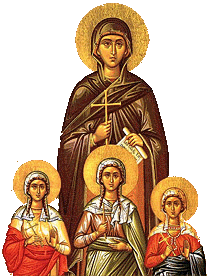


Saint Sophia Greek Orthodox Cathedral
Miami, Florida
Metropolis of Atlanta
Recommended Sites Latest News Categories Contact Us
There are special experiences in our corporate life as Orthodox Christians when the perception of God's presence and actions is heightened and celebrated. We call these events of the Church Sacraments. Traditionally, the Sacraments have been known as Mysteries in the Orthodox Church. This description emphasizes that in these special events of the Church, God discloses Himself through the prayers and actions of His people.
Not only do the Sacraments disclose and reveal God to us, but also they serve to make us receptive to God. All the Sacraments affect our personal relationship to God and to one another. The Holy Spirit works through the Sacraments. He leads us to Christ who unites us with the Father. By participating in the Sacraments, we grow closer to God and to receive the gifts of the Holy Spirit. This process of deification, or theosis, as it is known by Orthodoxy, takes place not in isolation from others, but within the context of a believing community. Although the Sacraments are addressed to each of us by name, they are experiences which involve the entire Church.
For more information on the sacraments and how you can participate in them click on the links below or email office@stsophiamiami.org:
Sacraments

Baptism brings about the birth of new life in Christ. The Orthodox Church practices infant baptism because historically it never required “understanding” as a pre-condition. To know God is the fruit of baptism. Baptism makes a person a participant in the death and resurrection of Jesus Christ and a member of His body the Church. This is the first step in becoming a follower of Jesus Christ.
The Church does have a responsibility to administer the sacrament only to those who have shown that this is the primary purpose for the baptism. From the day of their baptism, children are expected to mature in the life of the Spirit, with the guidance and support of their family and the Church. “Or are you ignorant that as many as were baptized into Christ Jesus were baptized into His death? Therefore we were buried with Him by the baptism into the death, that even as Christ was raised from the dead through the glory of the Father, thus also we should walk in newness of life. [Rom. 6].”
The Orthodox perspective of marriage is not predicated on what is deemed socially, politically, legally, economical, and/or philosophically correct. The Orthodox view is based entirely on the divine revelation of God’s truth, made manifest in his people, which has been handed down through the disciples and apostles.
Marriage is much more than a merely private transaction between two individuals; it is an event in which Jesus Christ Himself participates through the presence of the sacramental minister, the priest, and that of the praying community, the church. In view of this “ecclesial” dimension of marriage, therefore, a wedding must be performed within the context of the Orthodox Church in order for the Church to recognize and affirm the validity and authenticity of the marriage. Marriage calls man and woman toward a God-given “oneness” that only they will share. Every component of their bio-psycho-social humanity is called to participate in this oneness.


The Orthodox funeral service emphasizes and influences the formation of a healthy understanding of the true nature of life and death. It is a positive service featuring prayers for forgiveness and repose of the departed’s soul.
The service accomplishes the following: a) the occurrence of a death provides the opportunity to help us develop a more profound understanding of the meaning and purpose of life; b) helps us deal with the emotions one has at the time of death and as time passes after the death; c) emphansizes the fact that death is not the end, and affirms our hope in salvation in the Risen Lord; d) recognizes the existence of the emotions of grief cause by the death and separation of a loved one, and encourages their expression.


St. Andrews
The First Called Apostle
St. Stachys
Bishop of Byzantium